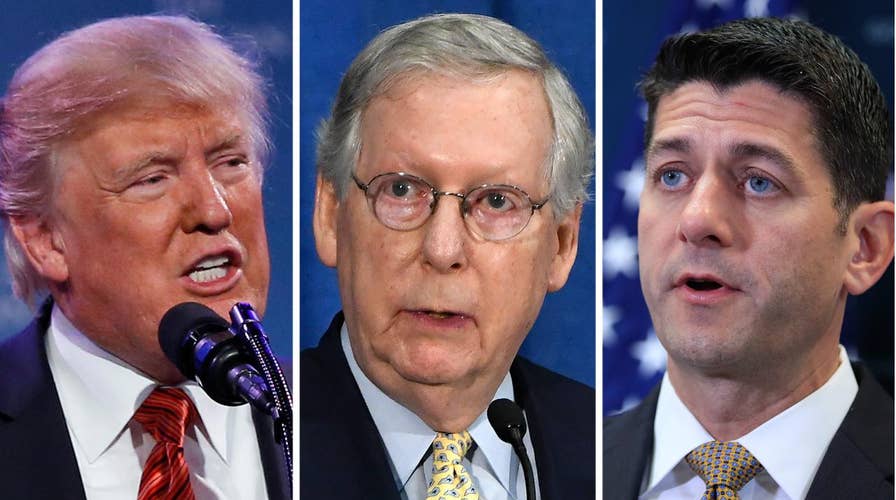Trump blames McConnell, Ryan for looming debt ceiling battle
GOP heading for self-inflicted wound? Reaction from 'Fox News Sunday' anchor Chris Wallace
Conservatives in Congress and the president are headed for two big confrontations—the annual budget resolution and raising the debt ceiling. Some lawmakers have threatened to link these to issues such as a solution for the Dreamers or Harvey relief funding, raising concerns about a shutdown or even a default.
Perhaps the time is ripe for a Reagan-style shutdown to bring government spending under control. Specifically, regarding the FY2018 budget, House Republican leadership have laid out plans that would substantially curb entitlements to significantly reduce the budget deficit and make room for a tax cut.
Regarding the latter, analysts generally agree the $19.8 trillion debt ceiling must be raised by September 29 or the federal government will not be able to keep spending at its authorized pace. That prospect started affecting markets for U.S. government debt as early as July.
Democrats will likely be joined by moderate Republicans in opposing such dramatic changes in spending and taxing priorities, and conservatives and perhaps President Trump could hold the debt ceiling hostage to funding for his controversial wall along the Mexican border.
Does anyone really believe the federal government, in a pinch, could not get along spending 16 percent less or that the United States of America would collapse if it tried?
Displaying their penchant for scare tactics and deception, Democrats and moderate Republicans in Congress hesitant to slash vote buying entitlements will warn if the ceiling is not raised, Uncle Sam will default on the national debt. And they tell us additional borrowing is needed to pay bills Uncle Sam has already incurred.
Nothing could be further from the truth!
In 2018, the federal government needs to borrow an estimated $440 billion, above what it collects in taxes, to spend $4.1 trillion. Hence, failing to raise the borrowing limit would leave the U.S. government 11 percent shy of what it needs to keep up its normal pace of activity.
The Treasury could easily refinance the existing federal debt—sell new federal government bonds to replace those that mature each month—if it keeps paying the interest on the total debt—$325 billion. It simply can’t add to the debt by selling even more bonds.
The bonds outstanding cover past spending. Raising the debt ceiling only permits Uncle Sam to spend more than it collects in taxes in the future.
Essentially, if the federal bureaucracy is put on a diet and compelled to get along on the $3.7 trillion it collects in taxes, pays the interest on the debt and sends out Social Security checks, it would have $2.3 trillion left to fund remaining planned spending of $2.8 trillion.
Does anyone really believe the federal government, in a pinch, could not get along spending 16 percent less or that the United States of America would collapse if it tried?
Curbing federal spending by that amount would require the president and the Director of the Office of Management and Budget to prioritize among obligations and planned new initiatives.
Certainly, the Army, Navy and Air Force have to be paid but entitlements could be curtailed. For example, it could send what money the Treasury can afford from current revenues to the states to finance Medicaid with instructions to give priority to mothers of young children, their offspring and the elderly before providing benefits to working age adults who are not working and have not made a credible effort to find employment.
Similarly, federal agencies could take a dose of that medicine in administering food stamps, Medicare and other entitlements. For example, it could slash what it pays for prescription drugs for the elderly, the poor and others by benchmarking federal payments to prices paid by governments and private insurers in Europe and Canada—that would end the gravy train for Big Pharma but it’s about time anyway.
Inside the bureaucracy, federal programs regulating, for example, public education, colleges and universities, could be suspended and setting standards for the schools and universities then would be left to the states.
Funding could be slashed or ended for regional agencies, such as the Appalachian Regional Commission and others, which seem to cultivate dependency on federal programs more than private investment and economic development. Or for NPR, which is already endowed and richer than most private broadcasters.
What it comes down to is curtailing politicians from buying votes with other people’s money—the business model of the Democratic Party and increasingly of moderate Republican governors and senators who oppose, for example, limiting access to Medicaid and other entitlements to the elderly and truly needy.
Democratic votes in Congress will be needed to lift the debt ceiling but Nancy Pelosi says “I don’t have any intention of supporting a lifting of the debt ceiling to enable the Republicans to give another tax break to the wealthy in our country.”
Fine, then force the Trump administration to do triage on federal spending and see whose ox gets gored.

